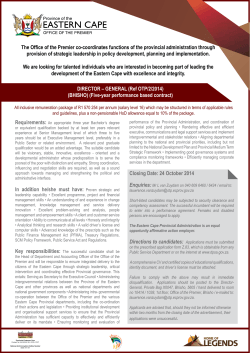
Course-âLevel Learning Outcomes
Transforming Student Learning Through A Learning Outcomes Approach To Curriculum Design Gary Hunt Thompson Rivers University gahunt@tru.ca Outline • Learning outcomes: what and why • Writing program-level learning outcomes • Getting started with assessment Learning Outcomes: What and Why • Learning outcomes are explicit statements of what students will know, be able to do, and value at the end of an educational experience • They clarify connections between learning goals for courses, programs, and the institution • They communicate learning goals to all institutional stakeholders • They integrate with program review • They are required for new program approval The Learning Outcomes and Assessment Approach Provincial Framework Institution Programs Courses The Curriculum Improvement Process Writing program-level learning outcomes is part of the self-evaluation of your program. Program Rationale, Goals Curriculum Improvement (Course-‐Level Learning Outcomes) Program-‐Level Learning Outcomes Collect, Analyze & Interpret Evidence Assessment Plan (Curriculum Mapping) How to Get Started Consider the characteristics of your ideal graduate based on these questions: • How would you describe the attributes of an ideal graduate of the program? • What are the essential knowledge, skills, and values that your graduates possess? • What distinguishes the graduates in your program from graduates in similar programs at other institutions? Writing Learning Outcomes The ideal learning outcome has three elements: – Action verb (what they will do) – Subject (the specific topic) – Context (circumstances) By the end of this program, successful students will be able to: – Communicate effectively in a professional environment through technical reports and presentations The verb is “communicate,” the subject is “technical reports and presentations,” and the context is “professional environment.” More Examples • Select and characterize appropriate materials for use in building wood-framed houses • Practice and evaluate group skills in support of team performance • Apply and integrate computer technology in design processes and products • Write a research report consistent with journalistic standards in the sciences • Produce a body of work suitable for seeking professional opportunities in fine arts BC Provincial Framework • Depth and breadth of knowledge • Knowledge of methodologies • Application of Knowledge • Communication skills • Awareness of limits of knowledge • Autonomy and professional capacity Small-group discussion • Individually, write one program-level learning outcome based on the prompting questions and the example • Indicate one or more provincial attributes that link to your outcome • Ask someone else to assess your outcome according to the listed criteria • Share and discuss with your group Semester Map Example Curriculum Map Example
© Copyright 2025





















